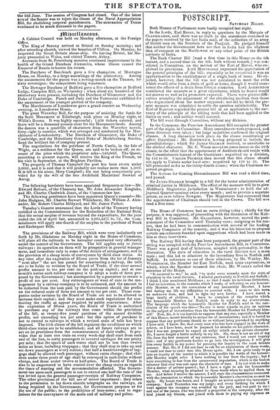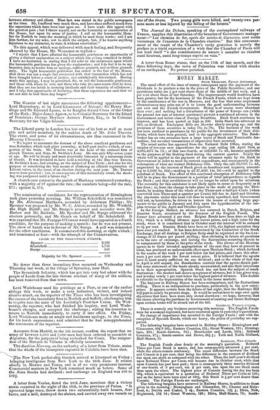The House of Commons had an extra sitting today ;
chiefly for the purpose, it was supposed, of proceeding with the discussion of the Rail- way Bill in Committee. Mr. GLADSTONE, however, moved the post- ponement of the Committee until Thursday next ; assigning as his rea- son, that he had been in communication with several of the leading Railway Companies of the country, and it was his intention to propose certain amendments founded upon suggestions which had been made to him at these interviews.
The Railway Bill having thus been postponed, the greater part of the sitting was occupied with the Poor-law Amendment Bill, in Committee. There was a good deal of bitterness, mingled with personality, in the discussion. The state of education in the rural districts was a main topic ; and this led to allusions to the incendiary fires in Norfolk and Suffolk. In reference to one of those allusions, by Mr. Wakley, Mr. WODEHOUSE, the Member for East Norfolk, used some expressions, to which, when the Speaker resumed the chair, Mr. WAKLEY called the attention of the House.
"It occurred to me," he said, " to make Boole remarks upon the state of education in the rural districts. I alluded particularly to Norfolk and Suffolk : I think I also mentioned Middlesex ; BO that I made no invidious distinction. I had no intention, in the remarks which I made, of reflecting on any honour- able Member, or on the connexions of any honourable Member. I have had during my life my difficulties to contend with. I came to this town. an unknown man, and had to fight my own battles. I have reared a. large family of children. I have to complain of the remarks mhich the honourable Member for Norfolk made in reply to my observations. The language which the honourable Member for Norfolk used in the con- clusion of his speech was this—' No one is more capable to give an opinion on the subject of incendiarism than the honourable Member for Finsbury him- self.' Now, Sir, it is too horrible to suppose that any one, especially a Member of this House, meant directly to accuse me of incendiarism; and it is horrid to suppose that any gentleman should do so without being provoked by anything I have said. I know, Sir, that every man who has been engaged in the work of reform, as I have been, must be prepared for attacks on his public character. But I was not prepared to expect an unfair attack on m' private character Sir, I never fought a battle unfairly in my life. Sir, there is not an act of my life, from the first moment of my existence, that I would not court inquiry into : and if any gentleman desires to go into the investigation, I will give him every facility in my power for pursuing the inquiry in the most minute manner. But, Sir, if I did not dare to ask for an explanation of these words, I could not dare to enter into this House again. Sir, I am quite ready to go into an inquiry of the matter to which it is possible the words of the honour- able Member might refer. I have nothing to fear from the inquiry ; but I have everything to fear from the unanswered imputation, which is the foulest calumny that ever was cast upon the character of man. I do not wish to make this a matter of private quarrel; but I have a right to ask the honourable Member, what meaning be attached to those words when he applied them to me. And before I receive the answer, I will state the circumstances connected. withthe transaction to which the honourable Member's observation seemed to apply. My house was burnt, and I brought an action against the insurance- company. Lord Tenterden was my judge ; and every farthing for which I went against the company was awarded by the jury, and was paid to me: and one of the jurors, who was himself a proprietor in the company, after the trial joined my friends, and joined with them in paying my expenses ef. between attorney and client. That fact was stated in the public newspapers at the time. Sir, I-suffered very much then, and have since suffered much from the aspersions which have been cast upon me. I have made this appeal with the greatest pain ; but I throw myself, not on the humanity or consideration of the House, but upon its sense of justice. I call on the honourable; Mem- ber for Norfolk to state the meaning in which he used those words; and I ask him further, for my sake, not to shirk the subject, but, if he knows anything injurious to my character, to state it without reservation."
To this appeal, which was delivered with much feeling, and frequently Cheered by the House, Mr. WODEHOUSE replied- " I rejoice that I have afforded the honourable gentleman an opportunity of giving a distinct explanation on a subject which has so long remained in doubt. I have no hesitation in stating that I did refer to the occurrence upon which the honourable gentleman has given the explanation ; and I do feel it to be my bounden duty to tender him an apology, onithese grounds, and on these grounds only. The right honourable gentleman has stated in the face of the House, that there was not a single fact connected with that transaction which has not been brought before a court of justice, and satisfactorily determined. Having made this apology, I may be permitted, Sir, to tell the honourable gentleman, and those with whom he acts, and those who take the same course that he does, that they are too lavish in accusing landlords and their tenantry of selfishness ; and I take this opportunity of declaring, that these aspersions are such that we are not able to bear them any longer."



























 Previous page
Previous page